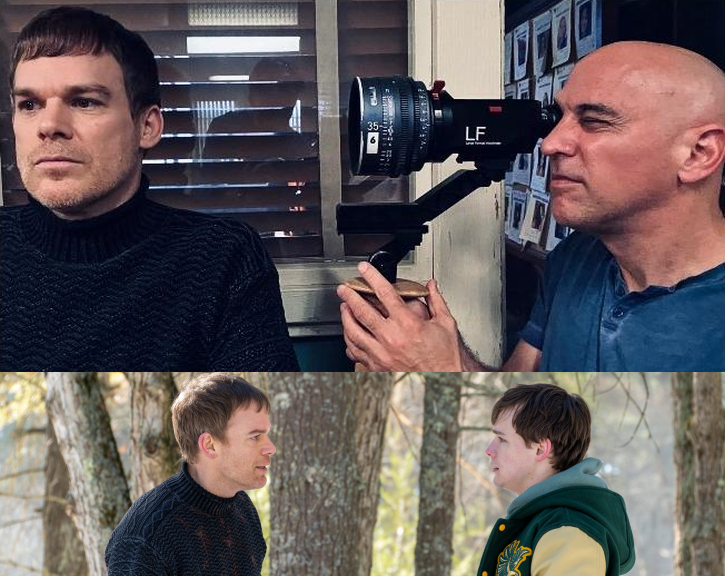 |
| Marcos Siega/Showtime |
Dexter: New Blood is now in the awards season conversation, and director Marcos Siega spoke with website SHOOT about the unique experience of shooting a TV show like a movie, working with Michael C. Hall, and more!
via: SHOOT | article written by Robert Goldrich: Siega, already an established director, was an unabashed fan of Dexter from the outset. He loved the writing, the protagonist, its graphic novel look and feel, and a wholly unorthodox narrative which had viewers connecting with and in some respects rooting for a serial killer. After season one, Siega--duly impressed by the show’s storytelling substance and unique visual language--felt the need to reach out to the people behind the series although the likelihood was that he’d have a hard time breaking into such a major hit. Siega wound up getting his much desired meeting with key members of the Dexter camp, including executive producer Clyde Phillips and producer Robert Lloyd Lewis. Siega evidently struck a chord with Dexter decision-makers as Phillips offered him a season 2 episode to direct. From that gig, the relationship grew as several episodes came Siega’s way each of the next two seasons, leading to a strong collaborative bond with, among others, Phillips and actor Michael C. Hall who portrayed Dexter.
That bond endured as Phillips and then Hall reached out to Siega for Dexter: New Blood. Phillips served as New Blood creator and showrunner. A strong mutual trust among Siega, Hall, Phillips and writer/EP Scott Reynolds made for an ideal creative working environment. Siega observed that Dexter: New Blood “felt more like making a movie than a television show,” adding that movies are “a director’s medium,” carrying the opportunity to “elevate the material” and shape a story. Siega noted that he could go to Phillips and pitch ideas in a way that normally isn’t associated with episodic TV. “You don’t usually have that sort of access,” related Siega. “Clyde allowed for that. He believes that a good idea is a good idea--and has no ego about it.” This afforded Siega the freedom to create a world, “to put my DNA” on it as you would a feature film. Siega described Dexter: New Blood as a special opportunity and “the perfect job.”
However, “perfect” doesn’t mean easy. As much as Siega wanted to work on Dexter: New Blood, it was far from a foregone conclusion that he could accept the assignment. Siega has an exclusive deal with Warner Bros. that would have precluded his involvement in the show. Ultimately, though, Warner Bros. agreed to loan Siega out to Showtime for a year so that he could take on New Blood after wrapping an episodic directing commitment on The Flight Attendant.
Then there were logistical hurdles that had to be cleared to tap into a strong narrative. Dexter: New Blood offered creative opportunities for character development as Dexter is haunted by the memory of his sister, and challenged by a son, Harrison, who’s back in his life, questioning why his dad had abandoned him. As Dexter reconnects with Harrison, we start to realize that certain doors cannot be selectively opened. Darker impulses that have been bottled up can also resurface. The father-son relationship is a major element in the rich human vein and pathos of the series. Yet taking that journey--mining that emotional well--required extensive planning by Siega and his colleagues. Circumstances such as weather and COVID considerations impacted the schedule, necessitating cross-boarding 10 episodes at 50-plus pages per script. Months of prep had to be done in order to build a doable schedule from some 550 pages of material.
Siega recalled, for instance, having to shoot scenes from episodes 1 and 10 on the same day. That kind of scenario must be meticulously mapped out on varied levels, including the director and actors having to be on the same page in terms of the proper context. Siega related that actors may have to delve into a scene from episodes earlier--that hadn’t been lensed yet--which puts them in a place emotionally that informs a scene about to be shot. He noted that a defining scene between Dexter and Harrison in the finale was shot just some three weeks into a six-month shooting schedule.
Siega assessed that “tracking these things out of order was a huge challenge” that ultimately “made me a better director.”
Meeting the challenge and becoming a better director are rooted, said Siega, in assembling the right team of creative partners--from writers to producers, the cinematographer, production designer, costume designer, editors, first assistant director, et al. Essential, he affirmed, are those collaborative relationships and “the idea that you can really trust people to do what they do and to do it well.” That trust came to fruition on Dexter: New Blood, added Siega, noting that he had “incredible partners on this project...people who I learned from.”
As for what’s next, Siega was in Miami at press time, directing episodes of Bad Monkey, an Apple TV+ series from Bill Lawrence, co-creator of Ted Lasso, and starring Vince Vaughn who is also an exec producer.
